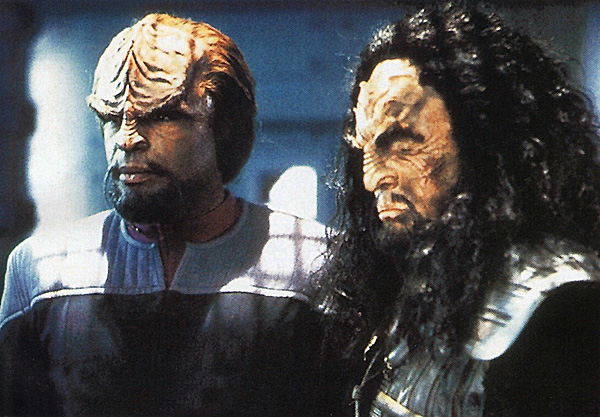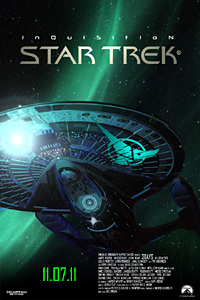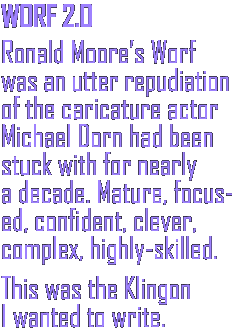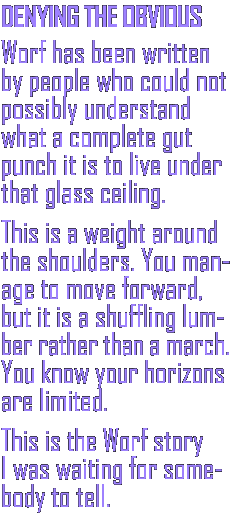
I never wanted to write Star Trek.
I just wanted to watch Star Trek, and I wanted the Star
Trek I was watching to be better than it was. The Original
Series was and remains a milestone in creative drama. Regardless
of the cheesy rubber monster suits and low-budget special
effects or even William Shatner’s shameless, hammy overacting,
Star Trek TOS revolutionized thinking about the possibilities of
TV drama. Gene Rodenberry’s hopeful vision of the future not
only thrilled and entertained us, it educated us. Some of it was
indeed heavy-handed and obvious, but it was done so creatively
we didn’t care. As a child, I thought, how remarkable this was,
that I could learn something, or at least, be intellectually and
morally challenged by something, that thrilled and entertained
me at the same time. TOS rarely had a villain. I’m not sure why
Trek has gotten into this conventional rut, now, of
mustache-twirling villains. In Roddenberry’s Trek, the villain
was usually us, our unresolved hatred for one another, our
refusal to love, refusal to grow or to learn. Roddenberry gave
the Enterprise crew obstacles to their progress, not just
cardboard cutout bad guys.
I was never interested in writing Star Trek comic books, mainly
because most of what I’d seen was pretty bad. Half the work of
drafting a comic book script is putting pictures inside your
head of what this will look like on the printed page. Most of
what I’d seen in Star Trek comics, at Gold Key, DC and IDW, were
really bad. Stiff, lifeless, still-born bad drawings allegedly
of Trek characters sitting and pushing buttons. That’s the hard
part about Trek for comics: the TV show and films largely
involve people sitting around pushing buttons. This does not
translate well or directly to comic books. Even the best comic
book scripts, many of them written by the brilliant Peter David,
just looked incredibly dull. There were the rare and unique
occasions of a brilliant script, say by PAD and others, and some
really great art, but those were in the minority. Trek comics,
for me, just sucked. I was and remain concerned that, even if I
had an idea for Trek, which I didn’t, that writing the script
would be an uphill battle for me because I’d be fighting against
muscle memory of scripts ruined in the past by bad art or by
artists more concerned with a fast paycheck than they were in
investing in good work.
My one Trek idea—of Worf’s bridge commander test being
manipulated by Starfleet to prevent his ever becoming
captain—was borne, I believe, out of a TNG episode in which
Counselor Deanna Troi takes the bridge commander test and learns
yawn obvious lessons along the way. I recall thinking the
episode would have been a lot more interesting had that been
Worf and had Riker, et. al. known that, no matter what Worf did,
he would never be promoted. A full commander could be given his
own ship. Even a routine act of bravery could promote a full
commander to the rank of captain, and that would never happen
for Worf, due to either institutionalized racism or to some
secret pact forged between the Federation and the Klingon
empire.
The idea just sort of rattled around my head, I assumed it was
an obvious idea that would eventually get done in some way.
Instead, Trek film after Trek film went to a great deal of
trouble to explain Worf’s presence in the movie while doing
nothing with him.
Worf was always a major disappointment for me.
With the notable exception of the brilliant work done by Trek
writer/producer Ronald D. Moore, nobody seemed to know what to
do with Worf. He was hot-tempered, immature, and despite being
both a Klingon and alleged combat expert, he lost virtually
every fight. He was an enormous joke, talking all this tough
Klingon warrior speak, but Worf was, time and again, the first
guy on his back during the Enterprise’s many forcible boardings.
Worf’s suggestions were overruled not only as a matter of
routine but as an icon of the series. In fact, I cannot recall a
single TV episode or film where Worf’s strategic recommendations
were accepted, followed, and/or proven right. Chief Engineer
Geordi LaForge provided a bit of ethnic balance to the series,
as the writers’ continued humiliation of Worf verged on a kind
of minstrel theme which I found marginally offensive. He was an
idiot, braggart, and far too immature to even have bridge
clearance, let alone serve as security chief.
Ronald Moore’s Worf, who stepped off of the transport shuttle in
the fourth season premier of Deep Space Nine, was so vastly
different, such an utter repudiation of the caricature actor
Michael Dorn had been stuck with for nearly a decade, that it
made me wonder if Dorn had made the transformation a condition
of his reprisal of the role. In the two-part premier, “The Way
Of The Warrior,” Worf was a mature, confident, clever, focused,
complex, highly-skilled combatant and key advisor to the series
lead, Captain Benjamin Sisko. Dorn was able to stretch as an
actor beyond the cartoonish beats of TNG and explore reams of
depth within his character I, frankly, didn’t realize were
there. If you’ve never seen DS9, seasons 4-6 constitute some of
the best television episodes ever filmed, Star Trek
notwithstanding. They are, however, a considered departure from
Gene Roddenberry’s lighter and more benign vision (for which DS9
received withering criticism), but I always thought DS9 existed
for what it was: an tougher and more adult exploration of the
themes Rodenberry’s vision provoked.
Post-DS9, Worf went right back to being a cartoon in the TNG
film franchise. His singular memorable moment was in confronting
Picard’s irrational behavior—an amazing switch for these
characters, as it was, traditionally, Picard talking Worf down
from the ledge. I chalk that moment up to Moore, though I have
no way of knowing which parts of Star Trek: First Contact belong
to Moore and which to co-writer (and bane of TNG) Brannon Braga
(though I can certainly make educated guesses: the good stuff
was Moore, the stuff you hit the skip button o your remote for
were likely Braga). ST:FC was also, to my immediate
recollection, the only time Worf was left in command of the
Enterprise, other than the a brief glimpse of him in the
captain's chair in the closing moments of Season Four's "Data's
Day," and the TNG episode "Time’s Arrow," where Picard orders Worf
to take command when he and his entire senior staff head back in
time to rescue Data (to, I suppose, avoid having to deal with having a black
man with them in the late 19th century). Worf in Picard’s chair, even on
the incomprehensibly stupid puzzle layout of the Enterprise-E
bridge, was a brief moment in the film, but, I assure you, Worf
fans (and, likely, all African American Star Trek fans) were
extremely pleased to see Picard return to the ship and find Worf
in the command chair. I’ve no doubt I was not the only one
thinking, It’s about damn time. For the remainder of the
spectacularly
wasted TNG film opportunities, Worf was, as was Dr. Beverly
Crusher, merely a voice in the chorus. I, frankly, do not know
why Dorn (or the tremendously talented Gates McFadden—an actual
actor) continued to show up. Worf was completely wasted,
returned to being a bumbling incompetent.
My Worf is the guy from “The Way of The Warrior.” Confident,
capable, experienced. Cunning, decisive, a very strong leader.
And, as evidenced early into my Inquisition story, wasting his time in
Starfleet, an echo of personal experience. I remember sitting at
a pub with artist Mark D. Bright, giddy over the blockbuster
success of our story, Spider-Man vs. Wolverine, and stupidly
thinking that book’s huge numbers would open doors for us.
Numbers like those would absolutely have opened doors for
anybody else. But our phones never rang. We were never invited
back for a sequel, and Marvel passed—twice—on sequel pitches
from me. The conventional wisdom attributed the book’s
record-breaking numbers to the characters; the talent had
nothing to do with it. While, at the same time, we were
routinely denied opportunities because our names weren’t big
enough—claims that comic sales were predicated upon the names
of the talent associated with them. Which one was true? For Mark
and I, both; whichever answer justified the “no” we constantly
received. At some point, I recall telling Mark that I knew, from
that experience, I would never be offered X-Men or any real
opportunity to succeed in the business. After all, if it were the
characters who sell comics, putting me on an unsinkable ship
like X-Men was hardly a risk; my work would be judged on its
merits. If it is the *name* that sells comics, then putting me
on Hawkman was an utter waste of time (but thank you, Paul, for
doing it anyway).
This, for me, was the missed opportunities of Worf, likely
because Worf has been traditionally written by people who could
not possibly understand what a complete gut punch it is to live
under that glass ceiling. To do your best and to, in many areas,
out-perform others whose efforts were rewarded and who were
given opportunities you never would be. Knowing, for a fact, I’d
never be offered Superman or X-Men, that I’d never make Group
Editor, let alone EIC. Peter David, a brilliant writer, friend
and once-fellow sufferer of Marvel Stigmatization, was at one
time rumored to be merely a pen name for me (which was
ridiculous; our writing styles are very different). He was
ostracized unfairly and given an enormously hard way to go, but
he more than succeeded, becoming, in fact, an industry legend.
If his work had, at least early on, been mistaken for mine, why
were opportunities made available to him that weren’t made
available to me? Some of that, likely most of it, was Peter
himself. Peter was simply more ambitious than I’ll ever be.
Peter kept knocking on closed doors while I just refused to beg
these people for anything and moved to Colorado. Peter built
success upon success, whereas, no matter how successful anything
I might have done might have been, nothing I ever did provided
for me a platform sturdy enough to build a career upon. Today,
in 2011, right now, when industry insiders read this, they’ll
roll their eyes and accuse me of whining. This is the insidious
nature of institutionalized racism: it is, at its core, an
impossible conversation. You are victimized by racism, then
stigmatized for simply bringing it up.
To look at two guys, their writing once mistaken for being from the same person, both
Marvel staffers working less than a hundred feet from one
another, both initially disliked personally if not intensely by the
editorial staff, starting from essentially the same time and
from exactly the same place, and completely discount even the
possibility that race played any role whatsoever in their
disparate career tracks, is a denial of the obvious. This is a
weight around the shoulders. You manage to move forward in the
occupation you love, but it is a shuffling lumber rather
than a march. You know your horizons are limited. This is the
Worf story I was waiting for somebody to tell.

Worf 2.0:: Ronald D. Moore fairly recreated the character, jettisoning Worf's buffoonish incompetence from the moment he stepped onto space station DS9. Finally respected and taken seriously, DS9's Strategic Command Officer kept the comic flourishes while plumbing greater depths of actor Michael Dorn's iconic portrayal. J. G. Hertzler plays Martok.
Where No Man Is Going
I will, at some point, post my rewrite of Star Trek: Nemesis,
a film so bad I just started fixing the screenplay for fun, but
ran out of time. Working on the script, I came up with my one
and only original story idea for Star Trek, which I just tossed
in a drawer and gave absolutely no thought to until I was
approached, for whatever ungodly reason, by IDW, seemingly out
of the blue, to develop something for them. We were not talking
specifically about Trek, but IDW had the Trek franchise, and I
said, “Oh, hey—you guys do Trek, right? Well I only have one
idea for Star Trek, but I’d really like to do it.” So I pitched
them the idea that later became Star Trek: Inquisition,
which was to be a three and then later five-part story. But a
couple things happened: first, Paramount bounced the story as
too edgy and controversial. I can’t imagine what’s become of
Trek that they now shy away from controversy, but the licensing folk
up there (at least, at that time) really didn’t seem to get it
that Roddenberry’s Trek was all about controversy, cached in
metaphors of half-black and half-white species. The notes back
from Paramount lent the impression, for me, anyway, that
Paramount or Trek felt like this story was accusing them
of something. Their general points green-lit the story so long
as we removed the core, the perceived racial bias against Worf.
IDW's editor discussed this with me, but my position was this
was the only story I was interested in telling. Green-lighting
the B and C stories was nonsensical if we're not allowed to tell
the story we're trying to write.
The licensing folks seemed to me like clerks reading from static
guidelines and over-protective of corporate
interests. They seemed to know the nuts and bolts of Trek while
not understanding its soul. They were not creative people, but
administrators insisting we round all the edges and pull the wings
off this particular butterfly. IDW seemed willing to go a few
rounds with this, but then Abrams Trek came along and re-shaped
the landscape. My story is TNG Trek. Once Abrams Trek became a
going concern, director J.J. Abrams had the right to approve all
Trek-related material, even stuff like my one idea which had
absolutely nothing to do with what he was doing. So now we had
to appease Paramount and Abrams, and the window for TNG material
at IDW narrowed as Abrams Trek’s release date approached. That
window remains narrow. I've finished the script mainly to get the
story out of my head. I cut a B-story dealing with Picard and
the Breen which was added, at IDW's request, to flesh the arc
out to a more trade-friendly five issues.
2013 Note: Abrams' shockingly derivative follow-up, Into
Darkness, used two key elements from my IDW pitch: the
underwater starship and the "Black Pearl" version of the
Enterprise, essentially the EE painted black. Neither are
terribly original ideas, but both appeared in summaries
submitted to Paramount and Bad Robot.
Today, in 2011, is it more difficult for a black officer to
achieve command status than it is for a white officer? I don’t
know. Emotionally and viscerally I am quite sure it is, but
that’s just my racism speaking. Racism has allegedly been
eradicated in the 24th century, but prejudice against alien
species has been demonstrated both in TOS and TNG TV episodes
and film installments. In my story, one of Worf’s chief
detractors is a black man, the irony of his racism lost amid
centuries of human racial enlightenment.
I always thought the best of Trek raised more questions than it
answered. I hardly consider this script the best of anything,
but the story does attempt to raise questions, not answer them.
It’s too Worf-specific to make a good movie, but it might have
made an interesting set of episodes at one point and, I think, a
fun comic book arc. Whatever it might have been, it is my one
(and so far only) idea for Star Trek. I would really have
enjoyed writing
this.
Christopher J. Priest
24 October 2011
Home | Blog | Projects | Comics | Rants | Music | Video | Christian Site | Contact
Star Trek Copyright © 2011 CBS Paramount. All Rights Reserved.
Unless otherwise specified, text Copyright © 2011 Lamercie Park. All Rights Reserved.
TOP OF PAGE




